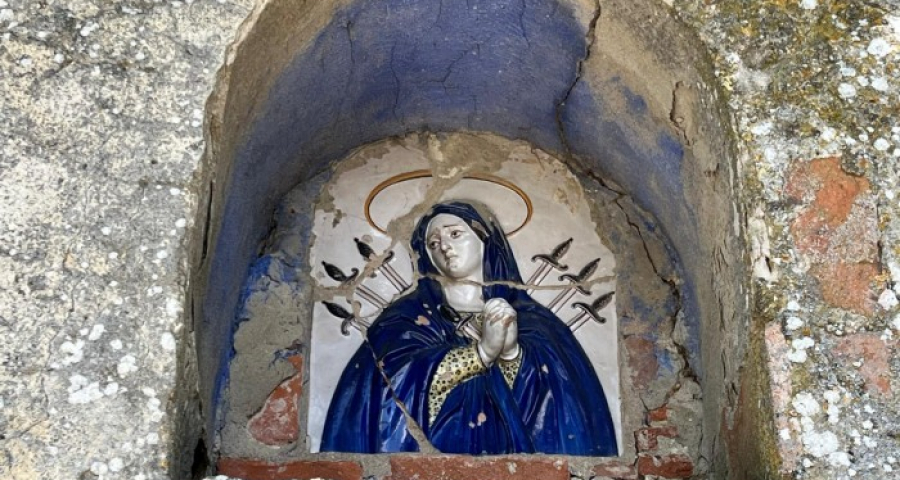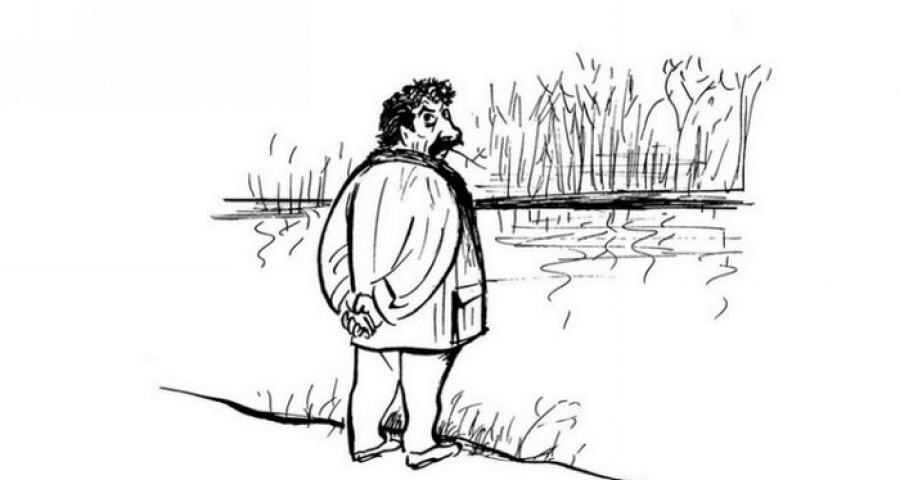Narrative Economy/3 - The entire existence of a Christian, says Silone's Celestine V, has one purpose: to become simple
by Luigino Bruni
published in Avvenire on 27/10/2024
“Truly precious are the gifts that life gives us; precious and strange, Marta replies. Those who want to enjoy them, and toil from morning till night to enjoy them, do not enjoy them at all, but burn and ash them soon. Strange gifts. He, on the other hand, who forgets them, and forgets himself, and devotes himself wholly, hopelessly, to someone and some thing, those receive a thousand times more than he gives, and at the end of life those gifts received from nature are still flourishing in him, like great roses in May.”
Ignazio Silone, Vino e Pane, 1937, p. 18
Ignazio Silone's The Adventure of a Poor Christian are a profound reflection on the nature of power, and a mediation on faith as a waiting for a Kingdom that cannot tarry.
Those who go through, carefully, the books of Ignazio Silone and are familiar with his biography, cannot fail to recognize something-sometimes a lot-of his author in Berardo Viola (Fontamara), Pietro Spina (The Seed Under the Snow), Don Paolo Spada (Wine and Bread), Luca Sabatini (The Secret of Luke), and finally Pope Celestine V (The Adventure of a Poor Christian). Because, "if a writer puts his whole self into the work (and what else can he put into it?) his work cannot but constitute a single book" (I. Silone, The Adventure of a Poor Christian, Oscar Mondadori, ed. 2017, p. 6).
What else, in fact, can a writer put into his works if not 'all of himself'? Actually, a writer, especially a great one (and Silone is one), when creating the characters of his novels undoubtedly starts from 'all of himself' but then arrives elsewhere, in an unknown place where 'himself' is no longer there or there is very little. For writers reveal well that mysterious and beautiful phrase of Jacques Lacan: "Love consists in giving what one does not have" (Seminar VIII, 1960-1961). They begin with what they have, with their whole soul, but then they really love us when they give us what they do not have, when their characters become bigger and freer than their already great and very great authors, and they begin to live in a land of the not-yet, unknown in the first place to their creators. In this, too, literature is creation, it is the truly unseen, it is widening the horizon of the human to populate it with other living beings who enrich and improve the existential stories of their authors and the history of all. One also writes to try to inhabit, without ever bridging, the sidereal distance between reality and our desires, between earth and heaven. 'Come out' is not only the cry that every author whispers to his creatures: it is he, it is she, who is the first recipient of that cry, to try to resurrect in his characters-because the only true desire is to resurrect.
Pietro da Morrone, Pope Celestine V, the protagonist of The Adventure of a Poor Christian (1968), is the last installment of Silone's 'cycle of the vanquished'. It is also Silone's last book, written as a play, which closes his 40-year reflection on social justice, the peasants, the poor, utopia, the gospel, Christianity, and his Kingdom that is yet to come, and may indeed come. The setting of the book, Silone's most explicitly religious setting, is the Abruzzi mountains of the late thirteenth century, where hermits and small communities of cenobites lived in an eschatological and apocalyptic atmosphere, a spiritual environment made up of Franciscanism and the prophecy of Joachim of Fiore, in the expectation "of a third age of humankind, the age of the Spirit, without Church, without State, without coercion, in an egalitarian, sober, humble and benign society, entrusted to the spontaneous charity of men" (p. 23). At that time, in fact, not a few Franciscans (among them the most famous was Pietro Olivi, also known for his economic ideas) saw in Francis the prophet of the new Age of the Spirit heralded by Joachim, of the unvanquished and imminent expectation of the coming of the Kingdom. Angelo Clareno, a character featured in Silone's text, was a Franciscan who was condemned and imprisoned because he adhered to Joachinite ideas.
The Peter of Morrone of The Adventure of a Poor Christian is also a figure of a prophetic Christianity, of Francis and Joachim of Fiore together, spiritual and messianic, to whom the late Silone entrusts his hopes for a different Church and world. Narrating Friar Peter's failed and uncertain attempt to reconcile the institutional Church (the papacy) with the charismatic one, Silone announces to us his idea of the Church and the good life: "The myth of the Kingdom has never disappeared from southern Italy, this land of utopia's election" (p. 23). We do not understand Southern Italy without taking this utopian and messianic soul of it very seriously: the South is also the expectation of another world, an unfulfilled prophecy of another economy and another society (Tommaso Campanella), the hope still alive in the fulfillment of a promise. The South, all the Souths of the world along with its marginal lands, are first and foremost a collective waiting for a not-yet, a question about the Kingdom that is to come, which no promise of commodities and profits can ever truly satiate - lies in this thirst and hunger the South's not-vanishing salvation.
The book is punctuated by Silone's auto-biographical reflections, particularly on the decisive event of his life, his youthful adherence to the Communist Party of which he was a founder in 1921, which later became a disappointment and finally an exit - Silone wrote his novels also to grieve the death of the great dream of his youth. A crucial existential event that as the years went by also became a 'theory' on the dynamics of ideal and ideological movements, which he would discuss in several writings (Uscita di sicurezza) and interviews (L'avventura di un uomo libero), still of great interest: "The founders are usually eagles, the followers generally hens" (p. 65). And again in The Adventure, on this he wrote: "Experience shows that the great community spontaneously generates aspirations for power, a will never entirely satisfied for successes and triumphs... As a community grows larger, it therefore becomes fatal that it resembles the society that surrounds it [and which it contested]. So what? Where does the salvation of the flock go?" Because of these dynamics, "even Joachim of Fiore resigned as head of his order. So did St. Francis. A large community demands compromises that, I am not saying a saint, but a simple honest man cannot accept" (p. 69).
Themes that will gradually become central to the book when, once elected pope, Brother Peter, who became Celestine V, will experience on his own soul and skin the difficulties of saving his Christian conscience along with the exercise of power. The inner conflict will be resolved by his famous resignation and the (likely) Dantean 'great refusal.' After abdicating, he will say, "I learned to my cost that it is not easy to be pope and remain a good Christian... The exercise of command enslaves, beginning with those who exercise it" (p. 130). Indeed, the book is also a profound and beautiful reflection on the nature of power and its logic: "The cursed 'for good'. My children, do not forget: there is only good, pure is simple; there is no 'for the sake of good'... Using power? What a pernicious illusion. It is power that makes use of us. Power is a difficult horse to ride: it goes where it must go, or rather it goes where it can go or where it is natural for it to go... The aspiration to command, the obsession with power is, at all levels, a form of madness. It eats away at the soul, distorts it, makes it false. Even if one aspires to power 'for good,' especially if one aspires to power 'for good'" (pp. 157-158). Power is a master who enslaves first and foremost those who command, even those who have sought it 'for good'; it is a ruthless ruler who feeds first on the leaders he has enchanted and only indirectly on their subjects. This is the curse of all wanted and obtained power, which because of this dimension of it really borders on the demonic: "The temptation of power is the most diabolical temptation that can be laid upon man, if Satan dared to propose it even to Christ" (p. 158). Very beautiful and prophetic are the pages on another 'great refusal' of Silone's Celestine V, that of blessing weapons: "With the sign of the Cross and the names of the Trinity, you can bless bread, soup, oil, water, wine, if you want even work tools, the plow, the farmer's hoe, the carpenter's planer, and so on, but not weapons. If you have an absolute need for a propitiatory rite, look for someone to do it in the name of Satan. It was he who invented weapons" (p. 123).
But The Adventure of a Poor Christian is above all a reflection on the nature of faith and the possibility of making the gospel the magna carta for a new society, for a different Kingdom here and now, and not just a sacred text of one religion like many. Hence the crucial question: can the Kingdom of Christ become something historical, or is life on this earth just the waiting room for heaven? An essential dimension of the evangelical spirit of this awaited Kingdom of Heaven is, for Silone, simplicity. In a dialogue, set in Naples, between the now Celestine V and some rhetoricians and court preachers, the new pope says: "I must first of all say to you: in preaching, if it is possible for you, try to be simple... True simplicity is a very difficult achievement." And he concludes with a phrase of great beauty: "The whole existence of a Christian, it can be said, has precisely this purpose: to become simple" (p. 100). An insight that is at once all human and all biblical. There is a deep soul in the Bible, that of the prophets, which sees the development of faith as a diminution, a reduction toward a progressive simplicity and essentiality, as an exercise in the arte del levare. The people's walk with their different God began on the slopes of Sinai where 'there was only a voice,' a bare voice that later became tabernacle, then ark, tent, finally Temple and palace of Solomon. The prophets went on to repeat, in various forms and much force, that that growth and increase had not been good, because salvation Israel would find it in the reduction and journey back from the palace to the bare voice, which happened through the Babylonian exile: "Perhaps, in order to rise again, the Church will first have to fully rot" (p. 159).
But even the good development of human life is a first growth from childhood to adulthood, which is followed by a second part of gradual and increasing decrease to the essentials, the part that from adulthood leads to its fulfillment, where there will be 'only one voice' that will speak only our naked name. The dowry we will bring will be the meekness we would have learned during this good decrease, to become so small as to be able to pass through the eye of the needle of the angel of death.













